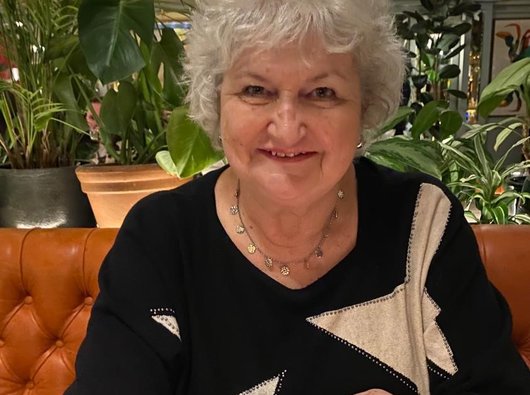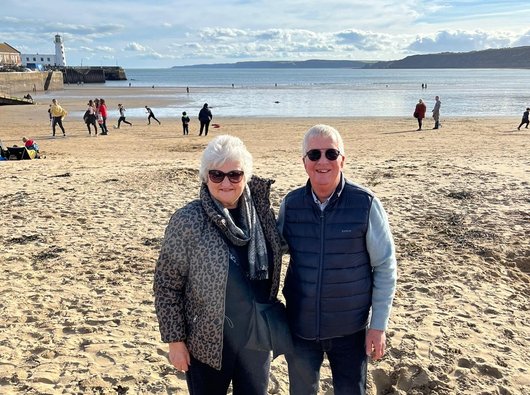Polycythaemia vera (PV) treatment
PV can’t be cured, but it can be controlled so that most people are able to carry on with life much as before. Current research into PV and other types of MPN holds the hope of finding a cure for PV in the future.
Treatment aims
The main aim of PV treatment is to lower your risk of blood clots and manage your symptoms.
Your hospital team will want to keep your haematocrit (the volume of red blood cells in your blood) at a low level. The target level is usually below 0.45 (45%), but you may start treatment when it’s lower.
You will have regular tests to check that the treatment is controlling your blood counts effectively.
Treatment options
The treatment you have will depend on your personal circumstances. Your doctor will consider:
- your age
- your haematocrit and other test results
- whether you have other conditions like high blood pressure or diabetes that raise your risk of blood clots.
They will discuss the treatment plan with you and take your wishes into account.
You may stay on the same treatment for a period of years. You may change treatment if the one you’re having stops working or causes serious side effects.
Your doctor may suggest you take part in a clinical trial. This is an opportunity to try a new drug or combination of drugs that may be not available outside of a trial. You can read more about clinical trials.
"It’s not a death sentence. There is treatment. And for me, the treatment has not been a problem at all. It doesn’t affect my life very much. I just have to take the tablets every day."
Jacqui, living with PV since 2021
Read Jacqui's story about taking a positive view of her diagnosis

Taking aspirin
Everyone with PV will take medicine to lower their risk of blood clots (thrombosis). Many people will start on a low daily dose of aspirin. People sometimes call this baby aspirin.
Your first treatment may be aspirin on its own if:
- you are younger (under 60)
- you don't have any other health conditions that make you more likely to get blood clots
- your haematocrit is under 0.45 (45%)
Aspirin is probably familiar to most people as a mild painkiller. It is also an anti-platelet medicine which works by making platelets less sticky. It is commonly used to prevent heart attack and stroke. That’s why it can be an effective treatment for people with PV.
Aspirin is taken either as a capsule or as a tablet you can dissolve in water.
If aspirin isn’t suitable for you, you may have another an alternative medicine called clopidogrel. Clopidogrel is a tablet that you take daily.
How you might feel
It may be confusing to be told you have blood cancer but only need to take aspirin. Some people struggle to make sense of it and find it tough. Others feel relieved not to need stronger treatment. These feelings are completely understandable, and you may even feel both things at the same time.
Many people with other types of blood cancer are in a similar situation. They will have regular check-ups but don’t need cancer treatment straight away. This approach is called active monitoring or “watch and wait”. We have information for people on active monitoring which you may also find useful.
Read Kate's story about the emotional impact of watch and wait.
Venesection (blood letting)
Venesection can be an effective way to reduce the thickness of your blood and is often used as a first treatment. Some doctors use the term phlebotomy, which means the same thing. It’s a similar procedure to donating blood, although the blood that’s taken can’t be used.
A doctor or nurse will insert a needle into a vein in your arm and slowly draw the blood out. The amount they take will depend on your size and the thickness of your blood, based on your blood test results. You will go to hospital as a day patient for this treatment.
After the blood is taken, your body quickly replaces the white blood cells, platelets and the liquid part of your blood (the plasma). But because it takes longer to make red blood cells, it takes a while for your blood to become too thick again. When that happens, you will have another venesection.
Your appointments may be every few weeks or months. Usually, you’ll need venesection more often when you start the treatment, then less frequently over time.
"Don’t watch the needle go in. Make sure you eat properly beforehand. And make sure you drink lots of water. The process only takes 15 to 20 minutes."
Alex, living with PV since 2019
Read Alex’s tips about venesection and how to manage your appointments.

Treatment to control your blood cell counts (cytoreduction)
Some drug treatments for PV aim to keep the number of red blood cells in your blood at a stable, low level. You may hear doctors call this cytoreduction – this just means that it reduces the number of cells. These treatments are usually recommended for:
- people over 60
- people who have previously had blood clots
- people with another condition that increases the risk of blood clots, for example, high blood pressure, diabetes or heart disease
- people with more serious symptoms of PV
- people whose blood cell counts can’t be controlled with venesection alone.
You’re likely to take aspirin alongside cytoreductive drugs. You may have venesection as well if needed.
The charity MPN Voice has leaflets which give more detailed information about each of these drugs.
Busulfan is an alkylating agent. This is a type of chemotherapy drug that works by interfering with the DNA in cancer cells, stopping them dividing and multiplying.
Busulfan is only used when other drugs have stopped working or aren’t suitable for you. It’s taken as a tablet.
Hydroxycarbamide is a type of drug called an anti-metabolite. It works by interfering with the DNA in cancer cells.
DNA is like a set of instructions for the cell. Damaging the DNA stops cancer cells maturing, so they cannot survive for long.
Hydroxycarbamide is a drug you can take as a capsule at home. It’s classed as a type of chemotherapy, so there may be warnings on the drug packaging that seem alarming if you’re not expecting to see them.
Most people get on well with hydroxycarbamide, and any side effects can usually be managed effectively.
It is important not to become pregnant or father a child when taking hydroxycarbamide because there is a risk to the baby in the womb. If you want to have a baby, talk to your doctor about other treatments.
Our bodies produce a substance called interferon to help us fight germs like viruses. The interferon you take to treat PV and other diseases is a manufactured copy of natural interferon. It helps your immune system find and attack cancer cells.
The type of interferon used to treat PV is called interferon alpha. It’s injected under the skin – you or someone who supports you at home can be shown how to do this. Or it can be given by your GP practice nurse or district nurse if you have difficulty.
It’s important to know that some people can become depressed when taking interferon, so tell your hospital team straight away if you notice a change in your mood when you start interferon injections. People usually tolerate a type of interferon called pegylated or PEG interferon better, and this is injected about once a week.
Interferon can be a good option for younger people as it doesn’t affect your fertility (your ability to have children) and is considered safe to take during pregnancy. But it is always best to check with your doctor before deciding to get pregnant.
Ruxolitinib is a targeted drug called a JAK2 inhibitor. Inhibitors work by blocking the signals that make cancer cells grow. It’s an option if hydroxycarbamide doesn’t control the PV, stops working after a time, or causes severe side effects. As of October 2023, it is approved for use across the UK.
Ruxolitinib is taken as tablets at home. Most people who take ruxolitinib have few side effects and manage well on it.
People on ruxolitinib must avoid foods containing grapefruit and Seville oranges (including juices) as these can affect how the drug works.
Important information for people taking interferon
You may already be aware that there is a shortage of inteferon, specifically a drug called Pegasys (pegylated interferon alfa 2a) in the UK. Read our information about the Pegasys shortage, what we are doing to help, and what you can do.
Clinical trials
Clinical trials are research projects that test new drugs or combinations of drugs on people. All the drugs will have gone through thorough safety checks before being included in a trial.
Trials look for better and kinder treatments and are a way of accessing a treatment that may not be generally available. They also provide vital information that will help doctors treat people effectively in the future.
You may prefer not to take part in a trial, and that is entirely up to you. Many people with PV and other types of MPN have opportunities to take part of a clinical trial and we have a clinical trials service that can talk through the process and help you decide what’s best for you. They can also look for trials that might be relevant for you to take part in.
Read our information about research and clinical trials. These research projects are funded by Blood Cancer UK, thanks to the generous people who donate and raise funds to help us beat blood cancer.

Talk to other people affected by blood cancer
Hear from and connect with people who understand.
Treatment during pregnancy
There is generally a higher risk of thrombosis (blood clots) during pregnancy, so pregnant women with PV need close monitoring. You may be looked after in a specialist centre during your pregnancy.
Your haematologist will work with an obstetrician (doctor who specialises in pregnancy and childbirth) to monitor you and the baby. The aim of treatment will be to keep your haematocrit in the normal range without harming the growing baby.
It is usually safe to carry on taking aspirin through pregnancy. You may also take an anti-clotting drug called LMWH (low molecular weight heparin). Your team may recommend interferon if you need treatment to reduce your blood cell counts (cytoreduction).
Talk to your hospital team if you want to get pregnant. Some treatments for PV can affect your ability to have children, or cause harm to the baby if you do get pregnant, so pregnancies ideally need to be planned.
If you need an operation
If you need to have an operation for another health condition, then your surgical team needs to know about your diagnosis of PV and get advice from your specialist doctor (haematologist).
You may need to stop taking certain drugs before the operation – your haematologist will advise how to do this.
No problem with my hip and knee replacements
When I told the orthopaedic surgeon I had PV, he had no idea what I was talking about and said he would have to check if I needed any special arrangements. He spoke to my haematology department who said it was fine to go ahead.
I took blood thinners after the operation for longer than normal, but that was the only difference.

